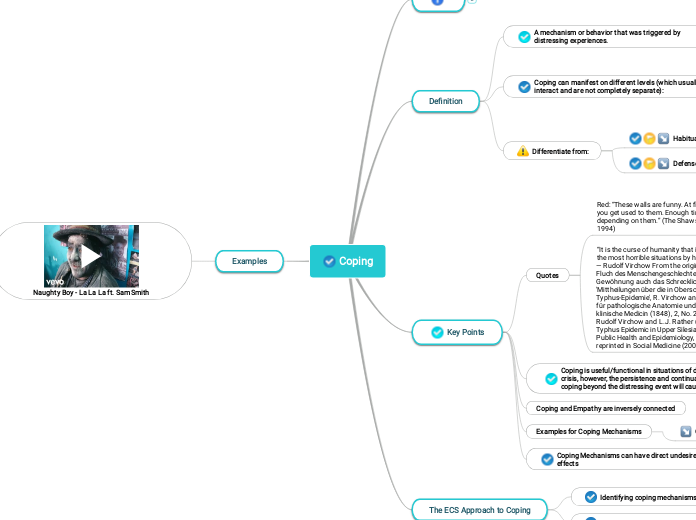Coping
Definition
A mechanism or behavior that was triggered by distressing experiences.
Coping can manifest on different levels (which usually interact and are not completely separate):
behavior
emotional structure
...
Differentiate from:
Habituation
Gewöhnung
Defense Mechanisms
Key Points
Quotes
Red: “These walls are funny. At first you hate them, then you get used to them. Enough time passes and you start depending on them.” (The Shawshank Redemption, 1994)
Habituation
“It is the curse of humanity that it learns to tolerate even the most horrible situations by habituation.”
— Rudolf Virchow From the original German, Es ist ein Fluch des Menschengeschlechtes, dass es durch Gewöhnung auch das Schrecklichste ertragen lernt, in 'Mittheilungen über die in Oberschlesien herrschende Typhus-Epidemie', R. Virchow and B. Reinhardt, Archiv für pathologische Anatomie und Physiologie und für klinische Medicin (1848), 2, No. 2, 156. As translated in Rudolf Virchow and L.J. Rather (ed.), 'Report on the Typhus Epidemic in Upper Silesia', Collected Essays in Public Health and Epidemiology, (1985), 213, as reprinted in Social Medicine (2006), 1, No. 1, 16.
Coping is useful/functional in situations of distress and crisis, however, the persistence and continuation of coping beyond the distressing event will cause issues.
Coping mechanisms who were once useful become dysfunctional after the end of the distressing event.
Coping and Empathy are inversely connected
Examples for Coping Mechanisms
Cynicism
Coping Mechanisms can have direct undesireable effects
examples
The ECS Approach to Coping
Identifying coping mechanisms
Reducing Coping Mechanisms
Examples
Naughty Boy - La La La ft. Sam Smith
An artistic illustration of how a child might find ways to escape a distressing situation by shunning the voices/sounds from the experience, and leave the place of the experience to BE a child.
backlink
